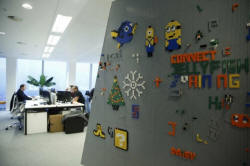|
London offices have
designs on tech as Brexit puts brake on finance
 Send a link to a friend
Send a link to a friend
 [December 22, 2016]
By Esha Vaish and Sarah Young [December 22, 2016]
By Esha Vaish and Sarah Young
(Reuters) -
High
up in western Europe's tallest skyscraper, an office layout shows how
the power balance in London's property market is shifting in favor of
booming tech companies and away from finance firms which may shrink in
London after the Brexit vote.
Some employees of digital marketing agency Jellyfish work from hot desks
at The Shard, gathered around a long pine table suggestive of a trendy
coffee shop, enjoying views of St Paul's Cathedral.
Edged by a bar with a screen displaying train times, floor-to-ceiling
whiteboards, cozy sound-proofed booths and a tap dispensing
barista-style coffees, the design encourages staff to work together.
"We wanted to be taken seriously, not just frittering client money away
with crazy guys on roller skates, so this is a serious space," said the
company's Chief Creative Officer Mark Deeprose.
Jellyfish's offices are one sign of how fast-growing tech firms are
calling the shots in the London property market, outshining the finance
sector which accounts for around 8 percent of British GDP and has long
been the cornerstone of the capital's property scene.
Property developers are ditching the marble fittings, suspended ceilings
and tight rows of desks associated with the grand old banks, replacing
them with more spacious irregular offices finished with the brickwork,
colorful furniture and exposed wires beloved of tech companies.

Since Britons voted on June 23 to leave the European Union, some
financial services companies have threatened to move operations to other
European capitals over fears that Brexit may prevent them serving EU
clients.
Tech companies, however, have shrugged off the vote and are expanding in
London, with Google <GOOGL.O> and Facebook <FB.O> leading the charge,
helping property developers with a greater tech exposure to outperform
their peers.
"Immediately after Brexit no one was doing anything but once we got into
August and September, all of the tech firms just seemed to say, well,
we're moving on," said James Roberts, chief economist at property
consultant Knight Frank.
According to the broker, rental demand from tech names including Apple <AAPL.O>
and WeWork meant that 2.7 million square feet (250,000 square meters) of
central London office space were leased in the quarter that followed the
June 23 vote, a 15 percent increase on the previous three months.
Interest from the likes of Spotify and Deliveroo promises to support
future office demand, and UK online fashion retailer ASOS <ASOS.L> has
announced plans to expand in London this month, drawn to the city's
talent pool and international status.
By contrast, Barclays <BARC.L> has announced it is sub-letting a quarter
of the space in one of its main offices in the Canary Wharf financial
district.

COFFEE SHOP STYLE
For ASOS's expanded and redeveloped London headquarters, it has used
software to map how its people use the building to encourage different
units to work together. It will also have a quiet library, and a
concierge service to help employees with their needs outside work.
"(Tech) is an active sector at the moment and we're seeing developers
beginning to acknowledge this within the way that they're building,"
said Simon Calvert, senior director of advisory and transaction services
at property firm CBRE.
[to top of second column] |

A worker passes an erasable ideas wall at the Jellyfish office space
in London, Britain December 19, 2016. REUTERS/Neil Hall

But
the growth in tech may not be enough to fill new commercial property space. The
City of London warns that up to 10 percent of jobs in London's financial
district may be lost if Britain fails to secure adequate EU access after Brexit.
At the same time, London office construction has reached its highest level since
2008, according to Deloitte.
British Land, developer of the "Cheesegrater" office tower in London's historic
financial district, is reducing the amount of office space it builds without a
guaranteed tenant, and is instead refurbishing sites to add more flexible
accommodation.
It has amended an existing planning consent at a site in Paddington, west
London, to introduce features such as sun terraces, a rooftop basketball court
and collaborative work spaces that position the building more towards the TMT
(technology, media and telecommunications) sectors.
"We'll
adapt tactically, but we're confident that's good for the longer term," CEO
Chris Grigg said, after the firm in November posted a fall in the value of its
office portfolio which gets 17 percent of its rent from banks and finance firms
and 7 percent from TMT.
French insurer AXA's investment management arm has decided to go ahead
with a new skyscraper in London's financial district, reversing a decision taken
in the wake of the Brexit vote to put the project on ice.
Harry Badham, who heads the UK development team at AXA IM – Real Assets, said
the 22 Bishopsgate site would aim to attract tech clients with a plan to offer
space for an incubator workshop for start-ups where they would charge lower
rent.
Luring
established tech clients requires not just space with an industrial, retro vibe,
but also flexible rental deals, said Andrew Sell, commercial director at Real
Estate Management (UK), which handles The Shard.

"Whereas before there was an aversion from the owners to have lease breaks, we
recognize it's really important for the tech sector because their rate of growth
is colossal," he said.
Software firm Sage Group, for example, negotiated at least two breaks in its
lease when it moved to The Shard, he said. Sage added extra space less than a
year later.
Providing tech-friendly offices may also eventually serve to attract financial
services firms anyway, said Neil Prime, JLL's lead director of Central London
Markets.
"Ten years ago maybe the banks' model was rack it, stack it and squeeze them
in," he said.
"(But) the banks are going to be competing with the Googles for these
digitally-enabled people, they are going to need to have that (tech-friendly)
environment," he said.
(Editing by Adrian Croft)
[© 2016 Thomson Reuters. All rights
reserved.] Copyright 2016 Reuters. All rights reserved. This material may not be published,
broadcast, rewritten or redistributed. |